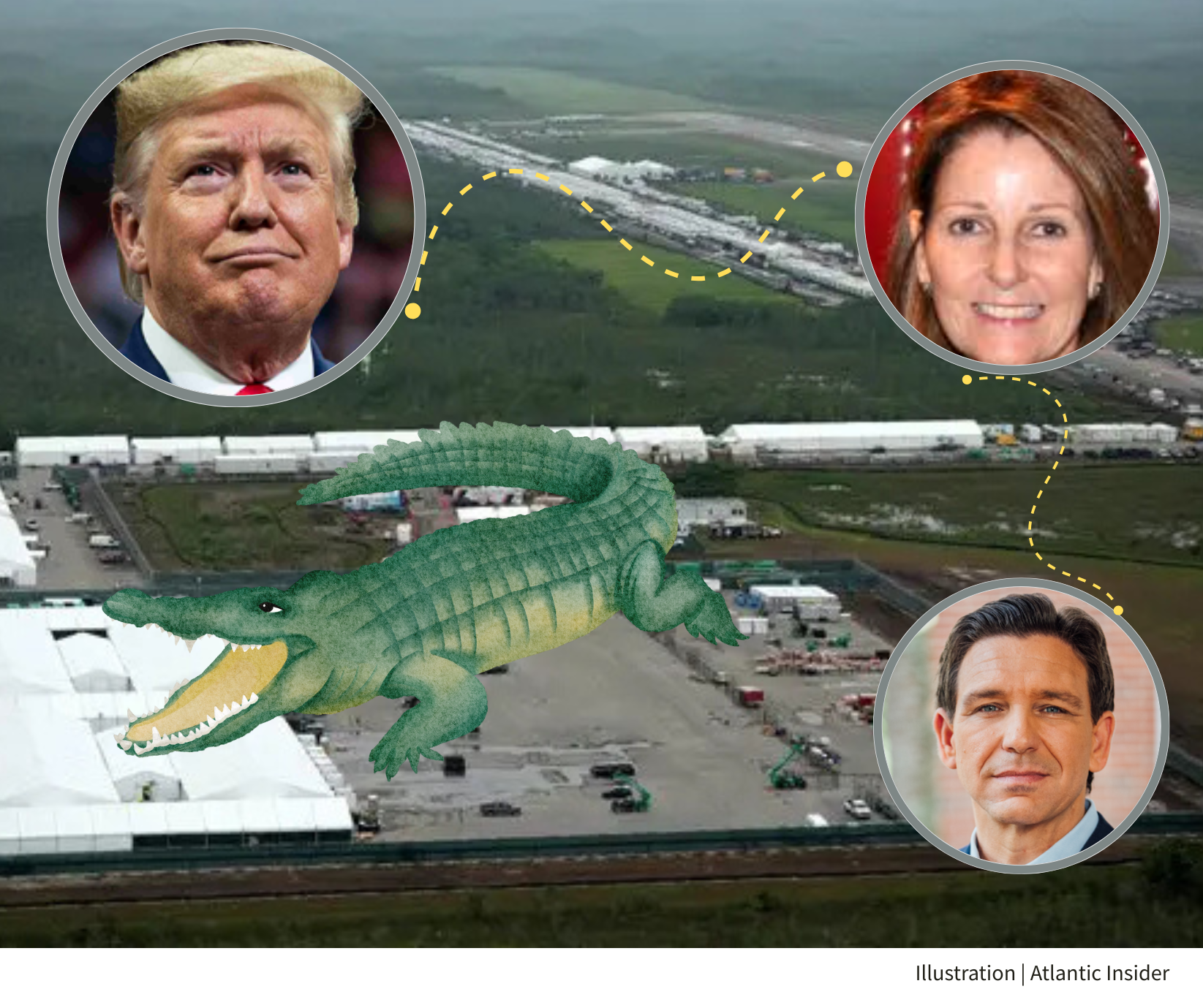A federal judge has delivered a stunning blow to Florida Governor Ron DeSantis's controversial immigration detention facility—dubbed Alligator Alcatraz—deep within the Florida Everglades.
In a sharply worded ruling, U.S. District Judge Kathleen Williams blocked the facility from admitting new detainees and ordered critical infrastructure removed within 60 days. The court found the state had violated environmental protections and bypassed tribal consultation.
But DeSantis isn’t standing down. Within hours of the ruling, the governor's office announced an appeal, vowing to continue the fight.
“We will appeal,” DeSantis said. “This facility is essential to our safety. It’s Washington that failed, not Florida.”
A Fortress in the Swamp
Alligator Alcatraz was born of urgency and spectacle.
Constructed in just eight days, the facility was pushed forward by the DeSantis administration as a rapid-response solution to a perceived border crisis. Set in the middle of protected wetlands, it was fenced, powered, and fortified with lights and surveillance—all without environmental review.
What began as a political stunt quickly became operational reality. Hundreds of detainees were airlifted to the site under state authority. Civil rights organizations, indigenous leaders, and environmental watchdogs swiftly filed suit.
Now, with the judge’s order in place and the state fighting back through appeal, the future of Alligator Alcatraz hangs in legal limbo.
Legal Blowback
Judge Williams called the facility’s construction “egregiously dismissive” of environmental law. Her ruling emphasized the irreversible damage already inflicted on endangered species and fragile Everglades ecosystems.
She ordered the state to halt further activity, disassemble surveillance towers, remove sewage lines, and relocate current detainees to existing federal facilities.
The court’s position was clear: no state, regardless of political urgency, can override foundational environmental and tribal consultation laws.
Despite this, the governor’s legal team quickly filed a notice of appeal, signaling a drawn-out legal war now headed to higher courts.
The Human Toll
Beyond the ecological fallout, the human stories within Alligator Alcatraz are sobering.
Detainees described being transported without notice, held in isolation, and denied legal counsel. Hearings were scheduled hundreds of miles away. Some were never notified. Medical care was minimal. Communication with family was limited, if not impossible.
Immigration attorneys called it a “legal black hole in the swamp.”
These weren’t just procedural failings—they were constitutional concerns. Lawsuits are pending, and the Department of Justice is reportedly reviewing the facility’s compliance with federal detention standards.
While the appeals process plays out, lives hang in the balance.
Ecological Crisis Ignored
The Everglades isn’t just swampland—it’s one of the world’s most vital wetlands, home to endangered species and a major freshwater source for southern Florida.
The judge’s order outlined serious risks posed by the facility: habitat destruction, noise pollution, contaminated runoff, and disruption to wildlife corridors.
According to environmental experts, the project was constructed over marshland without permits, displacing species like the American crocodile, panthers, and nesting birds.
“It was environmental malpractice,” said one Florida ecologist. “And it was done for political optics.”
The Politics of Provocation
Make no mistake—Alligator Alcatraz was about more than immigration.
It was a political totem, crafted by DeSantis to signal a hardline stance to his base. The name itself, likely coined by aides, was designed to grab headlines. The optics—a detention center in a remote, reptile-ridden swamp—played perfectly on right-wing media.
And for a while, it worked. National attention turned to Florida. DeSantis doubled down, calling the project “a model of state-level leadership.” But what he underestimated was the power of federal law—and a court willing to enforce it.
The Appeal Strategy
As of this writing, DeSantis’s legal team has filed a formal appeal with the 11th Circuit Court of Appeals. The governor’s office argues that the facility was constructed on pre-cleared land used for state disaster training for over a decade, disputing the claim that it disrupted new habitats.
The appeal also claims that the urgency of the immigration crisis justified bypassing environmental review—a defense that legal analysts say faces steep odds.
But politically, the appeal serves a broader purpose: to keep the issue alive heading into the 2026 election cycle. DeSantis is betting that judicial overreach will rile his base more than environmental violations.
A Symbol of Overreach?
Alligator Alcatraz may become a cautionary tale—a symbol of the risks of governance by headline.
In bypassing environmental laws, the DeSantis administration underestimated the checks that remain within the American system. The judiciary, often a final backstop, stepped in. The ruling was not just about wetlands or immigration—it was about limits.
And now, with a national spotlight fixed on the facility, both sides are digging in.
For some, Alligator Alcatraz is a necessary stand against federal inaction. For others, it is a reckless abuse of executive power.
What’s Next?
If the appeal fails, Florida may be forced to tear down the very facility it once showcased as proof of leadership.
Detainees will need to be transferred—many likely to the Krome North Processing Center or other federal detention centers. That process, itself complex, risks further human rights violations if not managed carefully.
Meanwhile, environmental recovery could take years. Some damage may be irreversible.
And politically, the fallout could reshape DeSantis’s national image: a strongman governor whose gambit was thwarted not by Washington, but by the Constitution itself.
Final Reflection
The rise—and likely fall—of Alligator Alcatraz underscores a deeper truth: even in an era of executive overreach and political performance, there are boundaries.
Environmental laws exist for a reason. So does due process. And when power attempts to skip both, the system—however imperfect—can still fight back.
For Governor DeSantis, the battle is far from over. But this time, it’s not just the swamp he’s fighting—it’s the law.
And the law, for now, is holding its ground.
%20(4).png)





